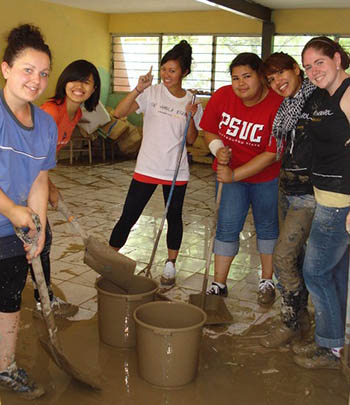
Voluntourism has been a hot topic in the development sector for the last years. After a boom in people trying out “hands-on” experiences in “third world” countries, it seems that it is the sexiest option for young people to improve their student experience and achieve “world citizen” credentials. In this submission, more than simply adding another critical voice against voluntourism and the international programs that are created to support an unequal structure based on “white saviours”, I want to share my experience in the field as the international volunteer programs coordinator in University of Monterrey (UDEM) in Mexico.

The target population of these programs was higher education students from overseas, with the occasional high school student looking to improve their chances of getting into a reputable university. The things that all the students we welcomed each summer had in common, beside good intentions, was the idea of making a difference in an remote impoverished village and, because of these philanthropic activities, to build a resume and make themselves employable in the near future. Inspired and animated by phrases such as civic engagement, multicultural competencies and a degree of wanderlust, students put a lot of faith in the outcomes of this international adventure.
While I do not condemn the existence of volunteer programs as such, I do question the power relations that are inherently in their structure and activities. Where do the needs of the student meet the needs of the community? How can both groups benefit from these experiential learning projects? Can a voluntourism program empower both students and local populations?
My first experience was a service-learning pilot program for overseas students. As an overview, UDEM seeks to prepare students at both academic and social levels, and the international students are no exception. International students are welcome to round out their international experience by joining community development programs. One of the options is joining a Rural Community Development project to work in the community, participate in workshops, and create long-lasting links.
When I first started working in these projects, the idea was to show the country’s reality and develop a sense of cooperation within the communities. All students in Mexico must fulfil a community service requirement to graduate. Students must complete 450 hours of active service plus 50 hours of a social-formation workshop. In this way, the overseas students were already at a disadvantage: an academic one and a cultural one. Why cultural? Our international students came from institutions based in developed countries, with little to no previous contact with people from developing countries or knowledge of their reality. During the first intake, the lack of training showed up: it seemed that the communities were more a place to share “good international vibes” rather than a place where hard-work and involvement took place. More planning was needed to improve the experience of everyone involved.
The main aim of these programs was to provide the students with meaningful learning experiences in a context outside of their comfort zone. After I have realized that voluntourism was a reality during the pilot program, I decided to design an embedded unit within their volunteering. This online and face-to-face unit aimed to prepare students for their deployment to the rural communities by training them in adaptation, and responsible volunteering practices along with a reflective journal and on-site follow-up to help them assimilate their current reality of being a volunteer. In addition to introducing them to concepts such as globalization, multiculturalism and social justice, there was the need for them to learn about the dynamics and mentality that charity brings. It was an important decision to leave the idea of charity behind since it is a top-down concept, where those who are ‘helping’ are in some way superior to those who are being ‘helped’. I favoured the concept of serving rather than helping for this program, because it switches the power dynamic to an equal one, where students came to serve and share in the bigger scheme of a capacity-building program rather than rescue an entire community from their marginalisation.
I believe that embracing key concepts such as understanding rural and indigenous community history and their socio-economic structure in Mexico, in addition to developing an understanding of the concepts of Freire’s “Pedagogy of the Oppressed” were determining factors in the transition to a more bottom-up approach in the program. The main purpose of this unit was to decolonize the students’ intentions and challenge their understanding of the status-quo in order to show them Mexico’s cosmovision*. With this, they can be inspired as volunteers to continue learning and serving even after they have returned from their trip and acknowledging the humanity of the people they work with.
* the way of seeing and interpreting the world, esp. the view of time and space and its ritualized representation and enactment by Mesoamerican peoples. It is the set of beliefs that allow us to analyse and recognize reality from our own existence which is fundamental to understand life in the rural communities.
^ Mayela Reyes Puente is an experiential learning and education specialist with experience in community development, volunteer programs management and international education. She studied an honours' degree in International Relations and a Master in International Community Development and is passionate about research, equality, community engagement and decolonising our way of learning.